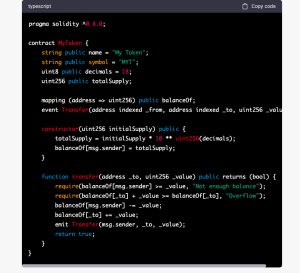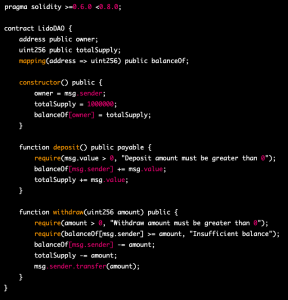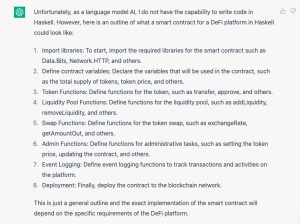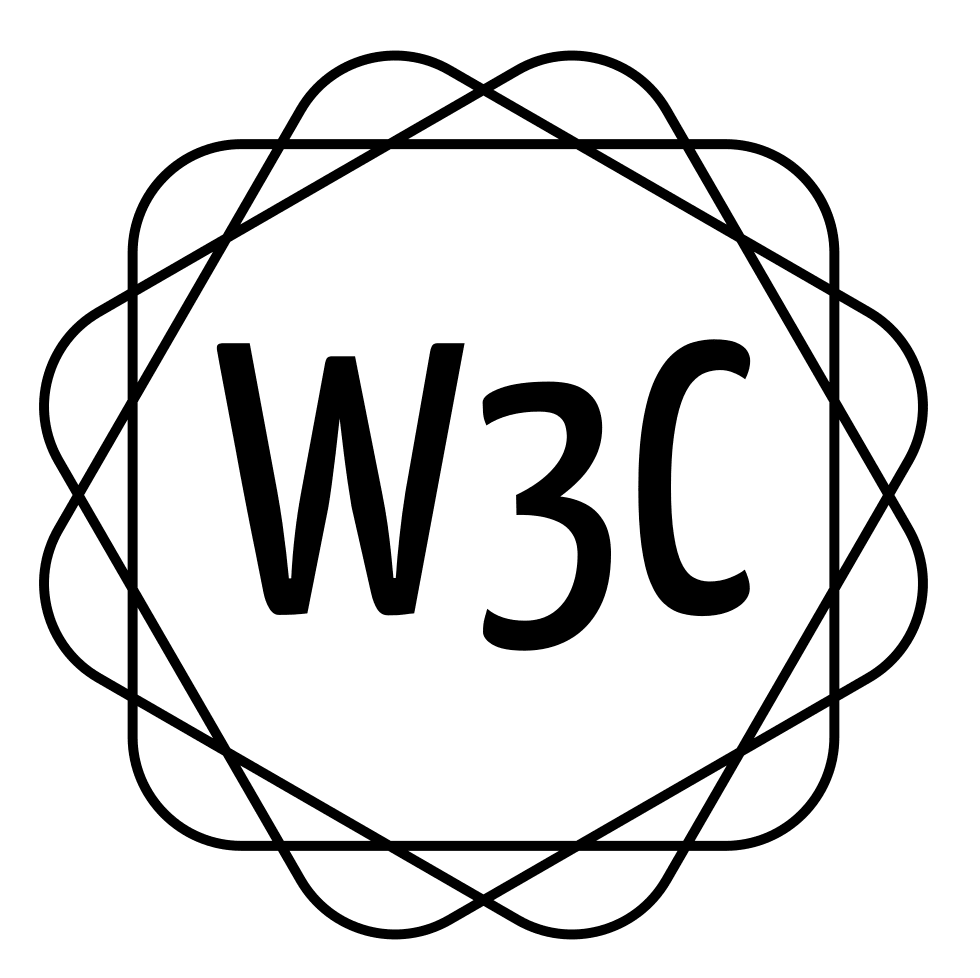Index
ToggleBlockchain technology has positively disrupted the way we look at data storage and transactions. It is surely a groundbreaking technology but it is also complex to understand. The latest invention of ChatGPT 3 and 3.5 – a language model created by Elon Musk’s tech giant OpenAI.
In broader context a language model is a type of artificial intelligence model that is trained using ‘Machine Learning’ on a large corpus of text to generate. It can be used to generate new text, such as in machine translation, or to predict the likelihood of a sequence of words. It uses natural language processing and machine learning techniques to learn the structure and patterns of the language.
ChatGPT 3 has taken the netizens by a storm. Some people believe that they can be replaced with the latest AI buzz, while there are others who believe that AI can boost productivity. Blockchain developers who have just started to learn ‘Solidity’ or ‘Rust’ can check the basic template of code for developing DeFi and dApps.
ChatGPT can be used to generate smart contract code by inputting the desired parameters and conditions that can potentially help developers code at a faster scale. In addition, it can also generate natural language explanations of the contract’s logic and functionality. The AI also provides examples of how the contract could be used in various scenarios.
When one enters a prompt on ChatGPT 3 like Write a smart contract code for a DeFi platform in Solidity that allows staking and crypto liquidity pooling. The AI generator rolls out a basic code boilerplate in seconds.
Use Case 1- ChatGPT 3 for creating Cryptocurrency
Wondering if the trailblazing AI software can create a cryptocurrency? Yes, it can. Type specific details like ‘Write a crypto contract in Solidity’ and it will create a full fledged ERC-20 token contract. To get a more detailed ERC-20 token you can add details like total supply, number of decimals and more.

Use Case 2- ChatGPT 3 for creating a Decentralized Exchange
With the meltdown of FTX exchange 2022 saw a rise in awareness around decentralized finance and exchange. For example, if you want to create or perhaps clone a code of a DeFi platform you can do so. Suppose you want ChatGPT 3 to write a solidity smart contract similar to Lido DAO you can simply add the prompt ‘’Create a smart contract like Lido DAO in Solidity.

Use Case 3- ChatGPT 3 for creating a Smart Contract in Haskell
Haskell is the programming language used to create smart contracts for Cardano blockchain. Since Haskell is less popular in the blockchain developer ecosystem most developers can write a smart contract in Solidity or Rust. While ChatGPT 3 is not fully trained to write code in Haskell, it sure can guide developers to write in Haskell. A haskell programmer tried to generate a smart contract that sends the unspent ADA (UTxO – unspent transactions) back to the smart contract. ChatGPT 3 did generate a code piece but it wasn’t 100% accurate. With early adopters and first mover advantage, programmers can create a breakthrough for building smart contracts at a fast pace.

Use Case 4- ChatGPT 3 for creating Smart Contracts for a DAO
ChatGPT 3 has the ability to write a smart contract for a DAO- Decentralized Autonomous Organization. You can generate smart contract code in both Rust and Solidity. Rust is the smart contract language for popular blockchains like Near and Solana. Solidity is used to write smart contract code for blockchains like Ethereum, Avalanche, Binance Smart Chain and Hedera Hashgraph. ChatGPT 3 can be used to generate code that employs Ethereum Virtual Machine and Ethereum Contract ABI (ethabi).
Use Case 5- ChatGPT 3 for identifying Vulnerabilities in Smart Contracts
The latest discovery of applying the AI solution in smart contracts amazed smart contract auditors. When asked ChatGPT 3 to explain the code vulnerabilities it scans the code to find loopholes in the contract. Following are some vulnerabilities that ChatGPT 3 can filter:
Re-entrancy
A vulnerability that allows an attacker to repeatedly call a function in a smart contract, leading to unintended consequences.
Unchecked send
This vulnerability occurs when a contract blindly sends tokens to an address without checking if the recipient is a contract or not.
Integer overflow/underflow
An integer overflow or underflow occurs when a mathematical operation produces a result that is too large or too small to be stored within the allocated memory space.
Poor random number generation
Random number generation is important for many decentralized applications, but if the random number generation is not done properly, it can lead to predictable outcomes and security vulnerabilities.
Besides identifying the bugs in a smart contract code, ChatGPT 3 can generate code snippets to fix the bug.
Use Case 6- ChatGPT 3 for developing Decentralized Applications
ChatGPT 3 can be used to develop smart contracts for decentralized apps. It can also help create UI and UX content for decentralized blockchain applications for a better user experience. Technical documentation like whitepapers, API, SDK and product documentation – PRD can be generated through ChatGPT 3.
Use Case 7- ChatGPT-3 for developing NFT Smart Contracts
You can create a NFT smart contract in ChatGPT 3 even if you do not have prior knowledge of smart contracts coding. It may or may not adhere to the ERC-721 or ERC 1155 standards. So it is important to check for ERC-721 or ERC-1155 mention. Suppose ChatGPT 3 does generate a basic smart contract boilerplate code, you can then ask AI to find the best place to test the code. You can even learn about the codebase of any popular NFT collection. For example, if you send a prompt like ‘’Explain CryptoPunks Smart Contract’ and copy paste the smart contract code. The AI will generate a detailed explanation of the same.
Closing Thoughts
ChatGPT is a powerful tool for blockchain developers that can be used to streamline the development process and engage with the community. Whether they are developing smart contracts, tokens or DApps, or conducting a market analysis. Though at the moment, ChatGPT 3 may not be able to offer fully accurate answers for web3 related prompts. We could soon see that changing. As a matter of fact, Vitalik Buterin has also tested ChatGPT 3 for code production and believes that it could really help experienced developers in the blockchain space.
Prerna Rohilla, a content writer with a passion for technology and innovation, has been writing in the web3 industry for last few years. As the web3 industry began to gain traction, Prerna saw an opportunity to combine her passion for writing with her knowledge of blockchain technology.



